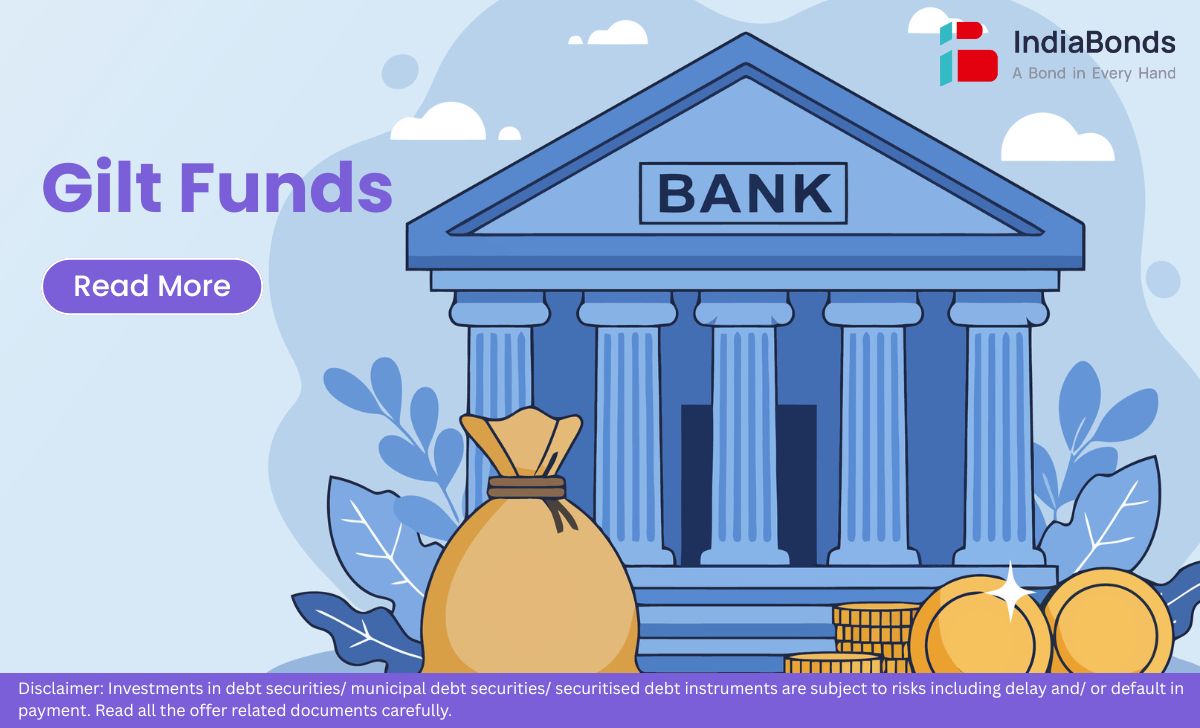Gilt Funds

Gilt funds sit in the safe corner of debt investing, holding only Government of India bonds. For a saver who wants quality first, they bring steadiness with market-linked movement. Think of them as the dependable half of a balanced fund, minus the equity swings.
List of Gilt Mutual Funds
- Open-ended gilt mutual funds with active duration management
- Target-maturity gilt funds that track government bond indices
- Short-duration gilt funds focused on near-dated securities
- Long-horizon strategies that hold 10–30 year gilts
What are Gilt Funds?
Gilt funds meaning: a simple way to access sovereign bonds without buying them directly. Because the securities are issued by the government, credit risk is minimal; prices still move with yields. In practice, gilt mutual funds pool many such bonds and pass any price gains or losses to investors through the NAV, keeping the experience transparent and easy to follow.
Features of Gilt Funds
- Sovereign credit quality and high liquidity in the bond market
- NAVs can rise or fall as interest-rate expectations change
- Clear portfolio disclosure that helps disciplined asset allocation
How Does Gilt Mutual Funds Work?
A professional team buys and sells government securities and manages duration. When the gilt funds interest rate cycle turns down and market yields fall, existing bonds become more valuable and the NAV goes up; when yields rise, prices can dip. That ebb and flow is simply how gilt funds behave.
How Should You Invest in a Gilt Mutual Fund
- Match goal and horizon; a long term gilt fund suits longer commitments
- Use SIPs or STPs to avoid timing worries
- Compare expense ratios and portfolio duration carefully
- Do not chase the best gilt funds only on last year’s chart
Why Should You Invest in Gilt Funds?
Gilt funds offer sovereign backing with market efficiency, making them useful when equity feels choppy. They can also express a view that rates may fall. Selection should be calm: lists of the best performing gilt funds change with cycles, so a plan beats prediction.
- Diversifies a portfolio built around deposits and equities
- Lets an investor benefit if yields decline
- Avoids credit risk while staying market linked
- Focus on process, not just the best gilt funds label
Taxation Rules of Gilt Funds
For taxation, most gilt funds are treated like other debt schemes. Capital gains are currently taxed at the individual’s slab rate, and indexation is not available. Dividends, where chosen, are added to total income and may attract TDS as applicable.
- Review the latest rules before investing or redeeming
- Consider holding period and personal slab when planning exits
- Remember that tax treatment is the same across most gilt mutual funds
FAQs
Q1. What is gilt mutual funds meaning?
Gilt funds meaning: schemes that invest only in Government of India securities. They keep credit risk low and pass market-linked returns to the unit holder.
Q2. What is the risk of gilt debt funds?
Mainly interest-rate risk. If yields rise, bond prices fall and the NAV can drop; the effect is stronger in longer-duration gilt funds.
Q3. Who should invest in gilt funds?
Someone building a clean debt allocation, valuing sovereign quality and transparency. Long-horizon investors and asset allocators often use gilt mutual funds for the core of fixed income.
Q4. Is investing in Gilt funds safe?
On credit, yes, because the bonds are sovereign. On markets, the NAV still moves with yields; patience helps when rates are rising.
Q5. Is it time to invest in gilt funds?
Timing depends on goals and views on rates. Rather than chasing the best gilt funds after a rally, a steady SIP and a defined horizon usually serve better.
Disclaimer : Investments in debt securities/ municipal debt securities/ securitised debt instruments are subject to risks including delay and/ or default in payment. Read all the offer related documents carefully.


















